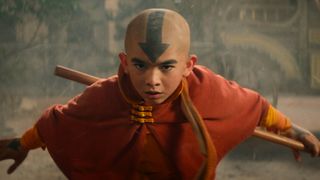
Avatar: The Last Airbender (ATLA) is widely regarded as one of the best animated shows ever made. Some simply consider it a highly enjoyable fantasy-style anime; others call it a masterpiece whose legacy extends beyond the confines of the animated TV space.
When Netflix announced in 2018 that it was remaking the universally adored Nickelodeon series, eyebrows were raised. The streaming giant's recent attempts to adapt other beloved animated shows have yielded mixed results – 2021's Cowboy Bebop being critically and commercially panned, while One Piece garnered glowing reviews and dominated the TV charts following its August 2023 release. Viewers might expect Netflix's Avatar: The Last Airbender to similarly fall into one of these camps.
In actuality, it sits equidistant between them. Netflix's ATLA is a largely pleasing homage to the original series and frequently entertaining but is undermined by superfluous alterations and an unmistakable identity crisis. It ultimately struggles to weave its various elements together.
Burdened with glorious purpose
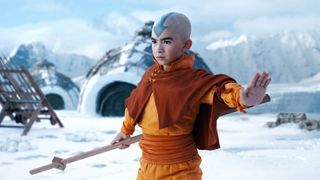
ATLA tells the story of Aang (George Cormier), the 12-year-old sole survivor of the Air Nomad tribe and the latest reincarnation of the Avatar. The latter is an all-powerful being with mastery of the four elements – fire, water, earth, and air – who maintains peace and balance throughout the world.
Alongside newfound allies in Southern Water Tribe members Sokka (Ian Ousley) and Katara (Kiawentiio), Aang embarks on a dangerous quest to master his dormant, limitless power and end the century-long rule of the tyrannical Fire Nation led by the callous Fire Lord Ozai (Daniel Dae Kim).
Iroh and Zuko's surrogate relationship is the true heartbeat of Avatar: The Last Airbender
Ostensibly, ATLA is another example of the classic Hero's Journey, but Aang is far from comparable to people's champions we've become accustomed to.
A pre-teen with messianic greatness thrust upon him, Aang is – obvious though it is to say – extremely hesitant to bear the weight of this responsibility. And, in Cormier, one of the first four Avatar actors to be unveiled, Netflix has found a star who captures the complexity of a child (one harboring unlimited primordial power) burdened with a seemingly thankless task.
Following in the footsteps of Zac Tyler Eisen – Aang's beloved voice actor in the original show – is no small feat, but Cormier captures the requisite child-like wonder, charm, naivety, goofiness, and self-doubt to play the titular character. Cormier's Aang also wears his heart on his sleeve, perhaps more so than Eisen's portrayal, which imbues his take on the series' reluctant hero with a rich poignancy. It's a modest tweak that raises the emotional stakes and challenges Aang's predominantly pacifist nature to, sacrilegious though it may sound, a greater degree than his animated counterpart (at least, this early in his personal journey).
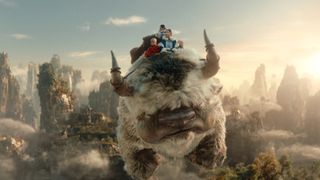
Encapsulating the soul-stirring and heart-breaking part of Aang's character is of the utmost importance, too. Avatar: The Last Airbender is primarily tailored for kids but, periodically, it's an incredibly dark tale that touches on topics rarely explored in youth entertainment.
From genocide and imperialism to gender inequality and philosophically existential subjects like spirituality, Nickelodeon's ATLA tackled these issues with grace and sensitivity. Netflix's adaptation doesn't skimp on them, either, though it's not averse to going harder than its predecessor with violence and discriminatory-positioned subject matter.
One such example is the Fire Nation's attack on the Air Nomads' Southern Temple in episode 1, a set-piece that appears to draw inspiration from Star Wars' universe-altering Order 66 event and satisfyingly builds on lore that's only briefly touched on in the original. It's a particularly unsettling watch and proves Netflix's remake isn't a wholly family-friendly retelling of Michael Dante DiMartino and Bryan Konietzko's original program.
Heroes and villains
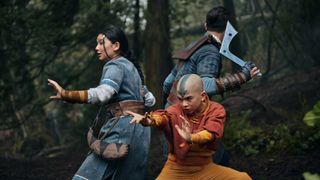
Joining Aang on the pre-teen character roster are Sokka and Katara, siblings with their own tragic backstory who are also forced to assume responsibilities beyond their age.
Ousley and Kiawentiio make for a satisfying pair as Aang's self-anointed guardians-in-chief; each actor injecting their diametrically opposed individuals with the mandatory characteristics that made them fan favorites. That said, the duo's performances and line delivery can come across as rigid and underwhelming, though the clunky nature of the adaptation's dialog and filmmaking approach may play a part.
The clichéd nature of Sokka and Katara's squabbles, although realistic by design and in keeping with their familial dynamic from the Nickelodeon series, also feel somewhat forced. The romantic dalliances between Sokka and Suki (Maria Zhang), and Katara and Jet (Sebastian Amoruso) in episodes 2 and 3 are equally banal, even if they are burgeoning relationships carried over from the original. By contrast, the pair's flourishing camaraderie with Aang is delightfully entertaining and sweet without being saccharine – further proof of Cormier's natural ability to elevate the performances of those around him.
Netflix's Avatar: The Last Airbender loses sight of the fact it's... aimed at kids
Villains-wise, Kim is somewhat underutilized as The Last Airbender's Big Bad. Sure, Ozai's appearances were fleeting in the original series – a drip-feeding tactic that creates an ominous aura around him when he graces the screen – but you don't hire someone of Kim's caliber and, outside of a commanding, scene-stealing display in episode 6's flashback sequences, reduce him to a bit-part role. Showrunner Albert Kim has regularly opined that Netflix's adaptation "is a remix, not a cover" of one of the best anime of all time; a creative decision that allows certain liberties to be taken with the source material and to broaden the narrative that the original tells. I feel, then, there was a missed opportunity to expand Ozai's role earlier in the story.
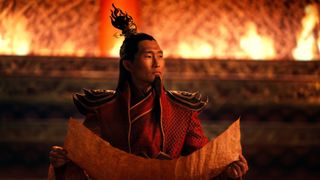
Thankfully, Netflix's remake finds time to gratifyingly develop the familial dynamic that exists between Ozai and his children: Zuko (Dallas Liu) and Azula (Elizabeth Yu).
Unlike the tight bond between Sokka and Katara, Ozai's ambitious but psychologically damaged offspring are estranged siblings who are regularly pitted against each other – by their emotionally cold father – in their pursuit of Aang, who the Fire Nation deems a threat to its colonial rule.
Avatar: The Last Airbender feels simultaneously rushed and sluggish
Yu portrays the intelligent, zealous, and sly Azula with impish delight as she pursues her father's approval and quest for perfection, but it's Liu's Zuko that I've reserved special praise for. Like Cormier, Liu embodies the emotionally traumatized Zuko down to a tee; the PEN15 and Players alum drips with the requisite impatience, tactlessness, impulsiveness, and rage that are the hallmarks of Aang's nemesis.
Liu is equally at home in scenes when Zuko's deep-seated vulnerability creeps to the fore, with such moments best demonstrated during tender scenes between Zuko and his nurturing, cheerleading mentor Uncle Iroh (Paul Sun Hyung). The pair's initial one-note dynamic is enriched by multiple tear-jerking sequences, including one in episode 4, which sees Zuko silently console Iroh when the latter's son dies during the Fire Nation's 100-year conquest of its neighbors. Scenes like this surprisingly position Iroh and Zuko's surrogate father-son relationship as the true heartbeat of Avatar: The Last Airbender and confirm Zuko's character development is the richest in the entire show. That was also the case in DiMartino and Konietzko's offering.
A song of fire and ice (and air and earth)
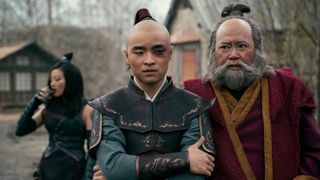
What's more distinguishable is how atmospherically different Netflix's ATLA is to its contemporary, and it's a tonal shift that's to the story's detriment. Indeed, Albert Kim has faced criticism for controversially suggesting Netflix's remake has to "appeal to the people who are big fans of Game of Thrones (GoT)". Based on this adaptation's overall vibe, high-fantasy setting, impressive world-building, and morally complex characters (I found myself flip-flopping between whether I should like Zuko or not, for instance) I can understand why the comparison was made.
The problem Netflix's retelling has is it wants to be taken seriously as a melodramatic and often brutish take on the source material. Yes, there are genuine moments of levity, even if they're eye-rolling, gimmicky jokes from Sokka, the cheeriness Iroh exudes, or Aang's playfulness. Even so, in its pursuit of appealing to older age groups, Netflix's ATLA loses sight of the fact it's a series aimed at kids/pre-teens. Unlike the original, it feels tonally imbalanced, with the trauma, pain, loss, and fury – baked into the show's DNA and regularly exhibited by its eclectic cast – overpowering its other important elements.
Cormier captures the requisite child-like wonder, charm, naivety, goofiness, and self-doubt to play Aang
Narratively, Netflix's ATLA feels simultaneously rushed and sluggish. At times, it appears as if there's too much and too little going on at once, particularly in earlier episodes. Each 50-60 minute entry has the air of three 20-minute installments from Nickelodeon's anime stitched together, but the way they're weaved into a single entity isn't conducive. Ripping up the original plot to build a revised plot from its puzzle pieces staggers the free-flowing narrative, with the result being uneven episodic storylines that uncharacteristically veer from the dramatic to the quirky, and the brisk to the turgid.

Its cause isn't helped by the expansion of, and slight revisions to, the original. There are story beats that pleasingly add to Avatar's wider narrative and globe-trotting grandeur, but I felt ambivalent about other creative changes.
The earlier-than-anticipated appearance of the monstrous centipede spirit known as Koh the Face Stealer (voice by George Takei), for instance, is a narrative misstep. It doesn't just ruin a key moment in the evolution of Aang and Zuko's initially frosty dynamic, but also sidelines Sokka and Katara – important supports for Aang during his quest, don't forget – for an entire episode.
Still, at least the 'bending' visual effects add a pleasing degree of creativity to ATLA's battles that would ordinarily be pretty average in their makeup and execution. Some animations, such as the primary fireball attacks employed by the Fire Nation, are par for the course, but the originality of seeing them use their incendiary abilities as makeshift flame-powered thrusters to reach out-of-reach opponents is a novel one.
My verdict
Avatar: The Last Airbender's trailers teased a fiery, epic fantasy show that Netflix needs, but the finished article isn't a rip-roaring success. It's far better than the absolutely awful 2010 movie adaptation, but its desire to be a revisionist take of the original show – complete with its jarring tonal shifts, GoT wannabe status, and archaic storytelling tropes – holds it back.
Considering how universally loved Nickelodeon's ATLA is, Netflix faced the seemingly impossible task of delivering a live-action remake that lives up to everyone's lofty expectations. It does its best to capture the essence of the original and, at times, it finds a welcome balance between the series' serious, silly, and sublime components. Equally, the inclusion of fan-favorite references (yes, Cabbage Man makes an appearance), plus its satisfying sense of spectacle, scope, and scale, make for pleasurable moments. Unfortunately, it's also a show that doesn't fully commit to the full, faithful retelling that long-time fans will – at the very least – be content with.
Avatar: The Last Airbender was one of 10 TV shows I was most excited to see in early 2024. While it's a gutsy interpretation of the original that finds its feet with each passing episode, there are too many missteps along the way for me to recommend it as a must-see reinvention of Nickelodeon's timeless classic. In short: don't expect to see it on our best Netflix shows list any time soon. Go and watch the original – also available on Netflix – instead.
Netflix's Avatar: The Last Airbender is available in full to stream now.
Get the best Black Friday deals direct to your inbox, plus news, reviews, and more.
Sign up to be the first to know about unmissable Black Friday deals on top tech, plus get all your favorite TechRadar content.
As TechRadar's senior entertainment reporter, Tom covers all of the latest movies, TV shows, and streaming service news that you need to know about. You'll regularly find him writing about the Marvel Cinematic Universe, Star Wars, Netflix, Prime Video, Disney Plus, and many other topics of interest.
An NCTJ-accredited journalist, Tom also writes reviews, analytical articles, opinion pieces, and interview-led features on the biggest franchises, actors, directors and other industry leaders. You may see his quotes pop up in the odd official Marvel Studios video, too, such as this Moon Knight TV spot.
Away from work, Tom can be found checking out the latest video games, immersing himself in his favorite sporting pastime of football, reading the many unread books on his shelf, staying fit at the gym, and petting every dog he comes across. Got a scoop, interesting story, or an intriguing angle on the latest news in entertainment? Feel free to drop him a line.
Most Popular

